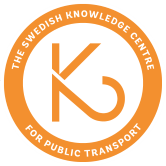
Public transport is increasingly viewed as a tool for the development of cities and regions, based on a broad sustainability agenda that includes economic, social and environmental aspects. Knowledge of the effects of public transport for individuals and for society as a whole is of crucial importance for decisions on traffic supply programmes, investments and other measures that lead to increased target achievement. In order to contribute to strategic decision-making, the effects of public transport must be understood in a context that includes overall demographic and technological changes in society.
A more systematic use of analysis methods, both before and after the fact, can contribute to increased knowledge and learning that will strengthen strategic capabilities in the long term. It is enormously important to also increase our knowledge of how analyses and their results are used and negotiated in practical planning and decision-making processes.
Overall research issues
A key aspect of the research area is to describe the effects of public transport on individuals and society, and to critically analyse how individuals and groups are described in analysis models. Impact analyses not only play an instrumental role in decision-making, but are often used conceptually or symbolically. Knowledge of effects must also, therefore, be analysed and understood on the basis of how decision-making processes work in practice.The following research issues have high priority in this area:
- How does public transport contribute to achieving local, regional and national policy objectives for sustainable cities and regions, e.g. regarding employment targets and reduced climate emissions?
- What effects do different types of actions have on travel and on passengers' experiences, e.g. accessibility measures for public transport? How can knowledge of such effects be used to guide the measures taken by municipalities and regions so that they can be expected to achieve the greatest benefit in terms of more sustainable travel?
- What are the system effects of actions in the public transport system and its components, e.g. new conceptual solutions, vehicle electrification, changes to infrastructure and the services offered? How can this knowledge be used to contribute to decisions that lead to the attainment of established objectives?
- How can citizens and passengers become more involved in analysis and decision processes? How can participation contribute to a better understanding of how public transport is perceived, how it functions and how it can be improved, and at the same time increase legitimacy with citizens for decisions on public transport development?
- How are analyses used in actual decision processes? How can analyses e.g. evaluations after the fact, be systematized in order to contribute to long-term learning within the public transport sector?
- Which new or developed models for impact assessments before the fact (e.g. simulation models) or after the fact, can support decision-making, in which the rate of change is high and uncertainty is high, for example, the use of new technology and new services? Which existing and future data sources can be used to support both operational and more strategic decision-making? Who has access to such data and with what consequences?
Expected results
The research is expected to contribute to new knowledge on the effects of public transport and to further develop methods for evaluating these effects. New insights on how decision-making processes work and what role analyses and methods of analysis play in these will be presented. The knowledge will contribute to more informed decision-making processes, to increased learning among public transport actors and greater participation by citizens. Overall, this will contribute to an increased ability to make decisions that lead to the attainment of established goals, e.g. regarding the transition required to achieve the climate goals.
